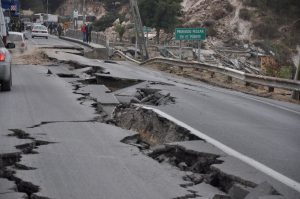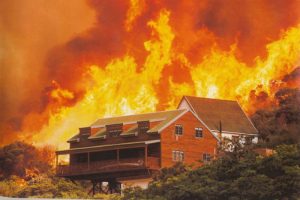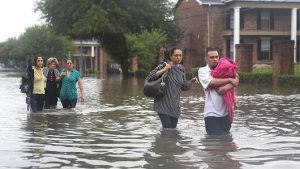LC Interpreting Services is now SignNexus!
Emergency Management Systems Neglect Deaf Citizens
During an emergency, it is important that people know what is happening, when it will happen, and what steps they are expected to take. Traditional information channels leave dangerous gaps in communication— at the first signs of crisis, d/Deaf and hard of hearing people are forgotten.
While America continues to reel in the wake of several large scale emergencies, there is room in the national discussion to address the inadequate crisis services that are available to the d/Deaf community. In times of disaster or crisis, most people turn to a trusted news sources for updates. But, for individuals who are d/Deaf/Hard of hearing, emergency information is delivered infrequently, late, and is often missing critical information — if this news reaches them at all.
GAPS IN ENERGENCY COMMUNICATION

Closed captioned television is already hit or miss, commonly plagued with spelling and contextual errors; but during emergency broadcasts, small inaccuracies can put lives at risk. Furthermore, less people now have televisions in their homes as the internet takes over. This means that more people getting their news online, where captioning for emergency announcements is usually not even provided.
We have seen time and again situations where ASL interpreters work a press conference in effort to communicate crucial updates to the Deaf community, only to be left off screen during the broadcast. We have also seen unfortunate situations where the “interpreters” offered to Deaf residents are exceptionally unqualified, which jeopardizes the health and safety of an entire group of people. Additionally, some hearing interpreters utilize a style of ASL that might be inaccessible to people with a different educational background. To reach the highest number of people, it is advised to seek the assistance of a local Certified Deaf Interpreter who is better equipped to connect with Deaf people in their native language.
The National Association of the Deaf has established a Position Statement on Accessible Emergency Management for Deaf and Hard of Hearing People which details the best practices for federal, state, and local government organizations. But still, the d/Deaf community gets left out of the loop on every level. When the wildfires began sweeping through northern California, many residents reported that they did not receive any text emergency alerts, which it turns out was due to a simple, yet lethal lack of established protocol within the local government. Once again, we see d/Deaf/HoH people completely forgotten in the panic.
DEAF WORKAROUNDS

Always seeking solutions, deaf people have time and again established their own makeshift systems for emergency management. Knowing that mainstream channels become unreliable, they utilize their own resources to spread information, share updates, and stay connected through crises. Social media has helped with this cause tremendously. Not only can people share their personal experiences and stay in communication with their families and friends, but on the other side of the coin, it allows non-profits, advocacy groups, and activists to amplify updates, and share needs and urgent requests of marginalized people throughout an emergency or disaster.
Let’s take a look at examples from recent events where the deaf community has jumped in fill in the gaps left by mainstream emergency management:
Puerto Rico – Hurricane Maria
- Off the Grid Missions has “a mission set-up to bring supplies SPECIFIC to the Deaf/HH who are located in the most remote regions of the island”. The organization aims to empower deaf people during disasters.
- Latino Deaf and Hard of Hearing Association of the Metropolitan DC Area organized a fundraiser specifically to help d/Deaf Puerto Rican residents rebuild and restart their lives.
Hurricane Irma – Southeastern US
- Florida Association of the Deaf president Lissette Molina Wood offers storm updates in ASL.
- YouTube user Paul Simmons put together a short clip comparing three different interpreters in Florida during emergency broadcasts to clearly highlight the dangerous inconsistency of services for the deaf community:
California Wildfires
- Deaf residents were using the Sonoma County Deaf Community Facebook page to share updates and important information as the wildfires continued.
- One Deaf YouTuber (Vance Deatherage) has created a playlist called NorCal Wildfires.
- Interview with a Deaf woman who had her ranch destroyed by CA wildfires (in ASL, no transcript)
Other Resources
- International Deaf Emergency
- NAD Emergency Preparedness
- Accessible Emergency Information Northeast Texas Public Health District has a large collection of Emergency preparedness videos and playlists on their YouTube channel.
*NOTE: This collection is brief and by no means exhaustive. Please feel free to add additional resources in the comments!
THE PRIVILEGE OF SAFETY
 The d/Deaf/HoH community has developed grassroots systems for crisis management and dissemination of information out of sheer necessity. After being left out and left behind so many times, deaf individuals have been forced to realize that the existing emergency procedures do very little to protect them. These community efforts are impressive, but they’re simply NOT enough.
The d/Deaf/HoH community has developed grassroots systems for crisis management and dissemination of information out of sheer necessity. After being left out and left behind so many times, deaf individuals have been forced to realize that the existing emergency procedures do very little to protect them. These community efforts are impressive, but they’re simply NOT enough.
Deaf people are highly practiced when it comes to navigating major rifts in communication, but in the event of a crisis their entire lives might hinge on this skill set. When you don’t even know there is a natural disaster, or a shooting, or a terrorist threat, how can you properly react? Once your house is gone and you have no cell service, where can you get aid?
In our modern world, with all the technologies available, there is simply no excuse for this lack of access to centralized emergency management. Deaf people have the right to real-time updates from a reliable source. They deserve to know the exact same details that are provided to the hearing population, so they can make informed decisions about their personal safety during times of crisis. Emergency information should not be a privilege granted only to certain citizens.







